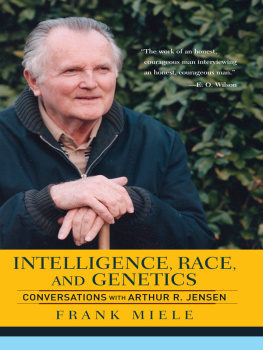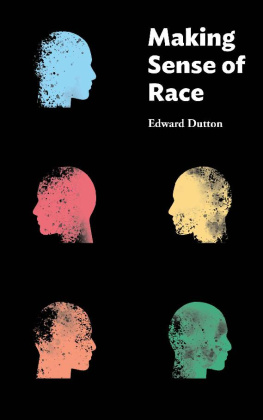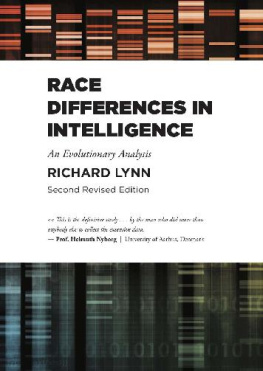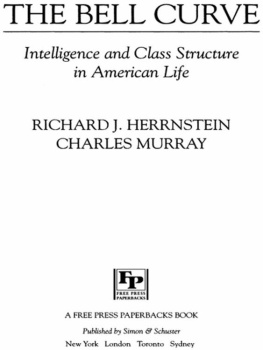INTELLIGENCE,
RACE, AND
GENETICS
INTELLIGENCE,
RACE, AND
GENETICS
Conversations with Arthur R. Jensen
FRANK MIELE
All rights reserved. Printed in the United States of America. No part of this publication may be reproduced or transmitted in any form or by any means, electronic or mechanical, including photocopy, recording, or any information storage and retrieval system, without permission in writing from the publisher.
Copyright 2002 by Westview Press, A Member of the Perseus Books Group
Westview Press books are available at special discounts for bulk purchases in the United States by corporations, institutions, and other organizations. For more information, please contact the Special Markets Department at the Perseus Books Group, 11 Cambridge Center, Cambridge MA 02142, or call (617) 252-5298
.
Hardcover edition first published in 2002 in the United States of America by Westview Press, 5500 Central Avenue, Boulder, Colorado 80301-2877, and in the United Kingdom by Westview Press, 12 Hids Copse Road, Cumnor Hill, Oxford OX2 9JJ
Paperback edition first published in 2004 by Westview Press.
Find us on the World Wide Web at www.westviewpress.com
A Cataloging-in-Publication data record for this book is available from the Library of Congress.
ISBN 0-8133-4274-0 (pbk)
eBook-ISBN: 9780786747610
To my late father, Edward J. Miele,
and my mother, Cecilia Miele,
who gave me both my genes and my environment;
and to my brother, Edward F. Miele,
who shares them with me.
PREFACE
Compensatory education has been tried and it apparently has failed. With that opening sentence of a 123-page-long article solicited by the prestigious Harvard Educational Review, Professor Arthur R. Jensen, of the University of California, Berkeley, went from being a highly respected but little-known educational psychologist to one of the most controversial figures in science.
Written in 1969 during the tumultuous days of the rioting in the Black inner cities and White voter disenchantment with Lyndon Johnsons Great Society programs, Jensens HER article set off a firestorm of controversy. The title, How Much Can We Boost IQ and Scholastic Achievement? and Jensens conclusion, Not much, made him a headliner in Time, Newsweek, Life, U.S. News & World Report, and The New York TimesMagazine, on the one hand, and the target of student protests, sit-ins, resolutions of condemnation, and even acts of vandalism and death threats on the other. The word Jensenismshorthand for Jensens theory that an individuals IQ is largely due to heredity, including racial heritagefound its way into some dictionaries.
In this book, I skeptically cross-examine Arthur R. Jensen on Jensenismhow and why he believes the scientific evidence is even stronger today that:
- IQ is real, biological, and highly genetic, and not just some statistic or the result of educational, social, economic, or cultural factors;
- race is a biological reality, not a social construct; and, most controversially of all,
- the cause of the 15-point average IQ difference between Blacks and Whites in the United States is partly genetic.
The late Stephen Jay Goulds Mismeasure of Man, Howard Gardners numerous books on multiple intelligences, and Joseph Gravess TheEmperors New Clothes argue that Jensenism and the controversial best-seller The Bell Curve (which draws heavily on Jensens work) are marginal science at best, pseudoscience at worst. Here, Jensen replies to these and other critics. He also answers the questions I think you yourself would like to ask him. He tells you why he believes the scientific basis of Jensenism is as solid as the Rock of Gibraltar, why the experts in the relevant disciplines of behavior genetics and psychometrics agree with him and not his critics, and why the public has been so misinformed.
This book also introduces you to Arthur Jensen, the man behind the ism, so that you can understand why he took up such a controversial research program and why he has pursued it so relentlessly. Finally, it takes you on the intellectual odyssey of the behavioral sciences over the past third of a century, detailing the sea changes that have taken place since Jensen and Jensenism first hit the front pages in 1969.
Frank Miele
Sunnyvale, California
ACKNOWLEDGMENTS
I could not have written this book without the help and encouragement that so many people have given me over the years. I would like to give particular thanks to publisher and editor-in-chief Michael Shermer and the staff of Skeptic, to all those who have given so generously of their time in allowing me to interview them for the magazine, and to my editor Karl Yambert and the staff at Westview. Additionally, the photos in the book were provided by courtesy of Arthur Jensen and the cover photo by courtesy of Lois V. Jensen, his sister, and I thank them for their permission to use the photos.
F.M.
INTRODUCTION
Jensenism and Skepticism
Jensenism, n: the theory that an individuals IQ is largely due to heredity, including racial heritage; after Arthur R. Jensen (born 1923), U.S. educational psychologist, who first propounded this hypothesis in 1965.
and
Skepticism, n: the search for provisional, not metaphysical, truth through the continuous and vigorous application of the methods of science, that is, formulating hypotheses and gathering data against which to test them.
J ensenism and skepticismwhats the connection? What does a controversial theory linking intelligence, race, and genetics have to do with a growing movement that promotes better understanding of the scientific method and greater use of critical thinking by the general public?
On the one hand, one skeptic icon, the late Stephen Jay Gould, who was then Americas best-known science writer, a distinguished though controversial scientist in his own right, and a past president of the American Association for the Advancement of Science, once claimed to have debunked Jensenism as resting on a rotten edifice. On the other, Intelligence, the most prestigious journal in the field of IQ research, devoted an entire issue to honoring Jensen and his work, which its editor, Douglas Detterman, titled A King Among Men: Arthur Jensen.
If these wildly varying assessments of Arthur R. Jensen and his theories of race, genetics, and human intelligence dont invite a skeptical examination and some critical thinking, what does? As senior editor of Skeptic, Ive interviewed some of the worlds leading scholars on differing sides of the race-IQ issue and related controversies in biological and behavioral sciences. Who better to interview than the namesake of the most controversial ism of them allthe relation between race, intelligence, and genetics?
I realized that a fair treatment of Jensen and Jensenism would require a book, not just an article. Jensen accepted, but could he commit the time? That year, 1999, he was based in London, England, working at the Galton Library on biographies of Charles Spearman and Hans Eysenck commissioned by the American Psychological Association (APA) and delivering the annual Galton Lecture as well as invited lectures at universities and research institutes in the United Kingdom, Denmark, Germany, Austria, Italy, and Spain. It wasnt possible for me to spend the year in Europe attending the lectures while we did the interviews. Even long-distance phone calls presented a difficulty because of the eight-to-nine-hour time difference, and they would be a budget buster. So we decided to conduct the conversations via E-mail. I wrote a series of questions on a particular topic, and Jensen replied. We had our printed transcript proofed, but the only other modifications are those requested by the publisher, Westview Press, to remove repetition, to clarify some of the more technical passages, or to update information and references to the scientific literature where appropriate.











